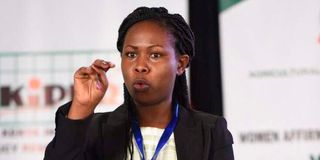Ashura: Kenyan Sign Language Bill 2023 needs major fixes for deaf rights

Ashura Michael is a human rights, gender, inclusion, and public policy advocate.
What you need to know:
- The Kenyan Sign Language Bill 2023 has major gaps and concerns raised by the deaf community.
- Key issues include inconsistent definitions, lack of a regulatory council, insufficient interpreter regulation, and inadequate provisions for sign language training.
The recent passage of the Kenyan Sign Language Bill No. 9, 2023 by the Senate is heralded as a significant stride in the pursuit of social justice and inclusivity for deaf community in Kenya.
The Bill represents a commendable effort by the Senate to address the longstanding challenges the deaf community face in accessing education, inclusive employment and justice.
However, amidst the jubilation surrounding its passage, it is imperative to acknowledge and rectify the crucial concerns and the gaps stakeholders within the deaf community in Kenya have identified.
While the Bill rightfully prioritises education, inclusive employment and legal proceedings, there remains a conspicuous gap in its scope. It fails to comprehensively address other vital elements pertinent to the Kenyan Sign Language (KSL) and the multifaceted barriers confronted by the deaf community. To this end, there is an urgent call for broader coverage within the Bill, including the establishment of the Kenyan Sign Language Council, whose strategic mandates will be to regulate Kenyan sign language interpretation and advancing the usage of KSL in full across sectors.
Global benchmarks
An area of particular contention lies in the definitions provided within the Bill, notably concerning terms such as "Kenya signed English" and "Sign Language." These definitions lack consistency with both constitutional standards and disability international convention and other standards. There is, therefore a critical need for precise definition of "Kenyan Sign Language" to ensure conformity with global benchmarks.
Furthermore, certain clauses within the Bill, such as the mandate for judicial officers to assess the accuracy of sign language interpretation, present practical challenges and warrant reconsideration.
Another salient concern revolves around the integration of sign language training into teacher education programs. While equipping educators with basic sign language skills is indispensable for fostering inclusivity, it should not be viewed as a substitute for specialised training for sign language interpreters.
The institution recommended by the established KSL Council should be the one assigning parents and guardians the responsibility of teaching sign language.
Moreover, the KSL Bill No 9, 2023 lacks adequate provisions for accrediting and regulating sign language interpreters. Collaborating with established regulatory bodies, or establishing a new council is imperative to ensure comprehensive oversight and quality assurance in sign language interpretation services.
Additionally, the qualifications outlined in the Bill for the registrar of sign language interpreters, are deemed inadequate and weak. A more stringent set of criteria, encompassing proficiency in Kenyan sign language and managerial expertise, would ensure the efficacy of the registration process.
Public policy
In conclusion, while the Kenyan Sign Language Bill 2023 represents a laudable advancement towards inclusivity, urgent amendments are imperative to address the identified gaps and concerns by the deaf community. The bill should be harmonised with the proposed Kenyan Sign Language Bill *No 1 of 2024, in the (National Assembly) sponsored by Hon. Umulkher Harun Mohamed (Ummi) or to supplant it entirely with the latter to ensure the enactment of comprehensive and inclusive legislation for Kenya's deaf community.
As a young deaf advocate for public policy and social justice, and on behalf of the deaf community in Kenya, we implore policymakers to accord priority to these recommendations for the effective realisation of the rights and welfare of over 2,000,000 deaf and hard of hearing individuals in Kenya.
Let us endeavour to enact legislation that authentically embodies the principles of inclusivity and social justice for all.
Ashura Michael is a public policy and social justice advocate





